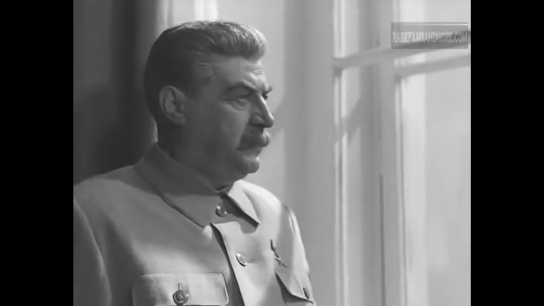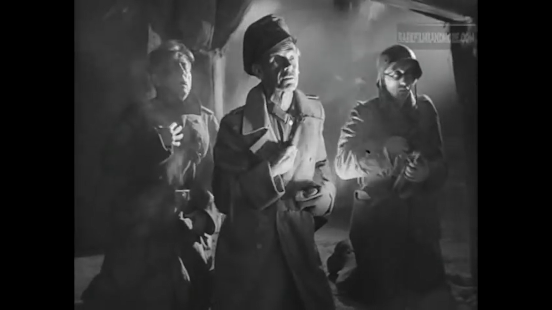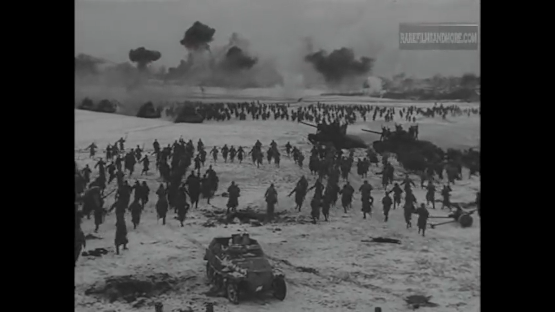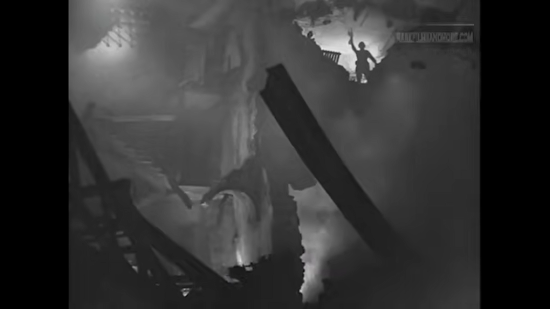The Battle of Stalingrad portrays the Eastern Front of World War 2 in a charming operatic style, centering the drama of the battle upon the key personalities of Stalin, Chuikov, Hitler, and Paulus, along with an array of supporting characters. The main focus is, of course, put on Stalin, endearingly called Josef Vissarionovich by his officers throughout the film.
The pacing of the film is fantastic. I particularly enjoyed how they portrayed the outset of Operation Uranus, with fast cuts between intense artillery barrages, the valiantly advancing Soviet army, the shattered German and Romanian forces, and the tense scenes of the German and Russian headquarters. The German headquarters are frantic and the officers worried, while the Russian officers are cool headed, foreseeing the German response in advance. The Russian officers are shown to be quick thinking and cunning, working to make sure that the German troops meet their doom in Stalingrad, cutting off every attempt they make to withdraw.
The film does a great job of conveying to the viewer that what occurs in the headquarters, that the orders and decisions made by the commanders is the ultimate cause of success or failure in the battlefield. In this, the war becomes an operatic drama between the personalities of the key characters of each side, acting as Homeric heroes. The whole war then focuses on the Kremlin, where Stalin, the most admirable and most capable figure on stage, resides. Stalin famously stayed in the Kremlin through the entirety of the war, commanding the front line from his offices, though this should not really be held against him as a sign of cowardice, as Moscow itself became a front line city during the Battle of Moscow. The Kremlin, as well as the forward command posts, then become the stage for a dramatic opera between the monumental characters.

Stalin is portrayed as a solemn, thoughtful figure, speaking in slow, measured words, never letting emotion or frustration overtake him, as he addresses all with respect and etiquette. He is a military genius, akin to Napoleon, often outshining his generals as they gather to assess the situation, cleverly reading the German army and anticipating their next moves. He is shown as socially intelligent, being able to read his commanders and assess their capabilities, assigning them roles which suit their strengths and weaknesses. As well, he is empathetic to the struggles of the Soviet peoples and his heart is heavy with the knowledge that they are suffering in this war. He asks his administrators on the living conditions in their regions and laments the horrific war, which wreaks such havoc on the home front. But above all, Stalin is determined to win this war, and from the outset he realizes that to do that, he must destroy Paulus’s army in Stalingrad.
Chuikov is stern faced and humble, having the disposition of an old farmer, rife with stoicism. He faces hardship without flinching, taking on his role in the defense of Stalingrad head on. He takes up command from a bunker on the front lines, with shells knocking the dirt from the roof as he reads his battle plans. He thinks nothing of that he may lay down his life in this battle, as that is his duty as a soldier. He is loyal, unwavering in his faith in the war effort, and most importantly, in Stalin.
The scenes with Hitler, though not particularly frequent, are intensely theatrical. Hitler is neurotic and erratic, with delusions of grandeur. While his armies still have not yet reached Stalingrad, he makes outlandish plans of destroying the Soviets, moving on Africa and the Middle East, demolishing Britain, and finally taking on the United States, shouting these aspirations to his generals as if they were sure to occur. While the battle is raging and it has become clear that it will not be an easy victory for the German army, Hitler is talking of moving the armies on the Stalingrad axis north to cut off Moscow, as if the battle for Stalingrad has already been won. His generals are yes men, who applaud him when he announces his grand plans, and cower meekly when he shouts at them when those grand plans inevitably fail.
Hitler is also unmoved by the suffering of his own men, forcing Paulus into a blind offensive into Stalingrad and refusing to allow him to mitigate losses. When Operation Uranus fully unfolded and it became clear that the German forces under Paulus must retreat or be encircled, Hitler demands that they stand and fight to their last man. Not only this, but that no attempt at breakthrough be made once the encirclement is completed. When the Soviets offer terms of surrender to the besieged German troops in Stalingrad, Hitler laughs and tears up the telegram, while Paulus reads it with a somber demeanor. Paulus knows that he must lead his men to certain doom, as Hitler would never allow him to accept any terms. While Hitler exclaims his glory and celebrates what he believes to be inevitable victory, the German soldiers are shown making the sign of the cross as Soviet bombs fall on their heads.

Notably missing from the cast is Marshal Georgy Zhukov, arguably the most famous Soviet commander of the Second World War, who played a major role in the defense of Stalingrad and Operation Uranus. Ultimately his successes made him too popular among the Soviet public, which, along with his voicing of dissent towards some of Stalin’s commands during the war, worried Stalin, causing him to strip Zhukov of his rank after the war and send him on assignment where he would be out of the way, with little influence and out of the public eye. Due to his personal issues with Stalin, he is glaringly absent from this film.
The film has great cinematography, with wide shots of massive battles and dramatic scenes of war room discussions of strategy. The scenes of the Soviet attacks of Operation Uranus have an immense sense of scale, with hundreds of soldiers running across the snowy hills, dozens of tanks interspersed in their advance, planes flying overhead and smoke billowing over the horizon. Many of these scenes seem more like documentary footage than a movie scene, as the scale makes it hard to believe that it’s only for film. Particularly dramatic is the scene of the 4th Tank Corps and the 4th Mobile Division meeting in Kalach, completing the encirclement as part of Operation Uranus, as the two vanguard commanders descend from their T-34 tanks to embrace eachother.

The battle scenes are not sparing with the use of tanks and planes. Explosions are liberally scattered across the battlefield as hundreds of soldiers run across. The filmmakers were lucky to have such open access to materiel, as the Soviet state not only had era appropriate Soviet equipment in surplus, but had also captured a large amount of German equipment in their advance to Berlin. The transition into the Cold War also made it apparent that much of the era appropriate equipment was obsolete, and thus the production team had no qualms about destroying tanks and planes on screen. I personally counted at least three scenes of planes crashing into buildings.
Perhaps my favorite scene is that of the taking of Pavlov’s house. After Stalin disseminates his order to intensify the street fighting in Stalingrad, the camera follows a squad of Soviet infantry moving through the rubble of the city and entering a destroyed house occupied by German soldiers. They move through the stairwell, clearing room by room, the camera following them from outside the house, as we see the action through the destroyed brick walls. With liberal use of grenades and submachine gun fire, they fight the German troops in tense close quarters combat, often having to fighting hand to hand. Taking the building, the sergeant of the squadron, the famous Yakov Pavlov, announces that he has captured this dwelling for the Red Army as the camera pulls back to show him standing triumphantly at the top of the stairwell with his gun held high in the air. Around him is the destroyed building his squad fought so valiantly to retake and defend, and shown around the building is nothing but the rubble and smoke of the destroyed city.

The musical score is also integral to the thread of the story presented in this movie. Following the scene of Pavlov’s men taking the house, they are shown stationed inside listening to a record of “The Cliff”, a deeply romantic song popular in revolutionary Russia, and a personal favorite of Lenin himself. Leonid Kharitonov of the Red Army Choir, renowned for his for his 1965 performance of the piece, claims that after his famous concert at the Tchaikovsky Hall, he was told by Marshal Kliment Voroshilov, who had spent the war in defense of Leningrad, that the song was also the personal favorite of Stalin himself. The scene of Pavlov and his men cross-fades to Stalin solemnly listening to the same record in the Kremlin, thus reinforcing the deep connection between Stalin and his men on the front lines. He feels with them as they lay their lives down for the defense of his namesake city, though he is hundreds of miles away in Moscow. The overall score, composed by the famous Aram Khachaturian, tends to incorporate motifs of “The Cliff” when presenting the Soviet Army, especially in the first section, while incorporating motifs of “O Tannenbaum”, which is a bit strange if your only prior exposure to that tune is as “Oh Christmas Tree”.
I found The Battle of Stalingrad to be a deeply enjoyable film, from its portrayal of Stalin as the Nietzschean overman, to the dramatic scenes of officers reading and giving their commands, to the massive battles stretching over the snowy steppes. At its core, the film is the ultimate presentation of the Great Man conception of historic dynamics, where it is fundamentally great men who decide the outcomes of history. In this, then, Stalin is presented as the Great Man, shoulder to shoulder with figures who come once every few centuries, figures such as Napoleon, Caesar, and Alexander the Great. As the main character, not just of this battle, but of the entire war itself, he stands head and shoulders above his loyal commanders, and in their conflict demolishes the arrogant Hitler, bringing the unstoppable German army to a sudden halt. My only complaint is the lack of mention of the Grain Elevator.

Leave a Reply